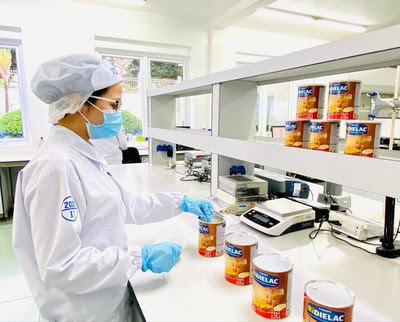HO CHI MINH CITY, Vietnam, 30 août 2021 /PRNewswire/ — La Vietnam Dairy Products JSC (Vinamilk) accélère ses efforts de R&D pour créer des produits innovants enrichis de saveurs locales afin de satisfaire les divers goûts des clients mondiaux
Grâce à ses investissements stratégiques dans le développement de produits, son expansion internationale et son engagement en faveur de la durabilité, Vinamilk est devenue la seule entreprise laitière vietnamienne à figurer dans le Top 50 des producteurs laitiers mondiaux en 2021, au 36e rang.
La touche locale de Vinamilk gagne la confiance internationale

Les efforts de Vinamilk en matière de R&D ont permis de développer des produits personnalisés adaptés aux marchés d’Asie, d’Afrique et du Moyen-Orient, malgré le défi que représente le manque de données de recherche dans certaines régions.
Ayant commencé avec une seule unité de stock de céréales pour nourrissons, la société a depuis développé et établi avec succès 66 unités de stock sur plusieurs marchés. L’un des produits innovants de Vinamilk est la céréale pour nourrissons Vinamilk Ridielac, au goût de banane et de datte. Lancées sur le marché du Moyen-Orient il y a 5 ans, ces céréales pour nourrissons, agrémentées d’une touche de saveur locale distinctive, ont été très bien accueillies, ce qui a favorisé leur pénétration ultérieure dans la région de l’Afrique du Nord grâce au sentiment partagé à l’égard de cette friandise.
Le géant laitier a également enrichi ses produits africains en vitamine A et en minéraux afin de contribuer à relever le défi de la carence en vitamine A. Ce problème a laissé 42,4 % des enfants d’Afrique subsaharienne avec un risque accru de mortalité infantile.
Au Moyen-Orient, qui représente 80 % des recettes d’exportation de Vinamilk, le produit Ridielac localisé de la marque est apprécié des locaux, notamment pour la variété des saveurs qui a permis aux consommateurs d’en changer régulièrement pour l’alimentation quotidienne de leurs bébés.
En Asie, Vinamilk a introduit le lait de coco condensé sucré au Japon pour répondre à la demande de lait végétal, tout en satisfaisant les consommateurs locaux allergiques au lait.
« Notre relation à long terme avec Vinamilk a été construite sur des services d’exportation précis et flexibles et des produits de haute qualité répondant à toutes les normes japonaises. Nous avons trouvé le nouveau lait condensé à la noix de coco impressionnant et nous espérons qu’il sera performant sur ce marché », a déclaré M. Jun Hamada, partenaire japonais de Vinamilk.
La stratégie commerciale durable qui entraîne la croissance malgré le COVID-19

Le succès de Vinamilk à l’étranger est dû à une solide équipe de R&D composée de personnel hautement qualifié ayant une connaissance approfondie des réglementations alimentaires sur les marchés d’exportation, ainsi qu’à un investissement continu dans la coopération internationale.
En collaboration avec des partenaires locaux, notamment des instituts de recherche en nutrition nationaux et internationaux, Vinamilk fournit des valeurs nutritionnelles qui correspondent le mieux au marché local.
Depuis 1998, Vinamilk a enregistré une croissance significative des marchés d’exportation, des catégories de produits exportés et des UGS. Les activités à l’étranger représentent actuellement 15 % du revenu total de Vinamilk.
Grâce à sa stratégie commerciale et à son orientation durable, Vinamilk a connu une croissance régulière au cours du premier semestre de 2021, malgré les défis posés par le COVID-19, avec des recettes d’exportation de 2 772 milliards de VND (121,5 millions de dollars), en hausse de 13,1 % par rapport à l’année précédente
Vinamilk continue de réaliser des investissements importants pour son expansion mondiale

Pour l’avenir, Vinamilk vise à étendre sa portée mondiale pour servir davantage de marchés internationaux. L’entreprise a annoncé la création d’une coentreprise avec Del Monte, l’un des principaux producteurs et distributeurs de produits F&B aux Philippines. La stratégie consiste à investir massivement dans l’industrie laitière et à offrir aux consommateurs philippins des produits laitiers et des boissons sains, adaptés à leurs goûts et à des prix raisonnables. Les produits de la coentreprise devraient arriver chez les consommateurs philippins en septembre 2021
Vinamilk possède trois usines aux États-Unis, en Nouvelle-Zélande et au Cambodge, ainsi qu’un complexe agricole laitier au Laos. La première phase de construction du complexe agricole, qui a une capacité de 8 000 vaches et produit environ 44 000 tonnes de lait par an, devrait être mise en service au premier trimestre 2022.
À propos de Vinamilk
Fondée en 1976, Vinamilk possède actuellement 16 usines et 13 fermes au Vietnam et à l’étranger. L’entreprise possède de solides compétences en matière de R&D, avec des ressources humaines hautement compétentes et des laboratoires modernes et bien équipés, certifiés VILAS – ISO/IEC 17025.
Médias :
Ms. Pham Hong Hanh
+84-28-54-155-555
phhanh@vinamilk.com.vn
International :
Mr. Vo Trung Hieu
+84-28-54-155-555(Ext.102102)
vthieu@vinamilk.com.vn
Photo – https://mma.prnewswire.com/
